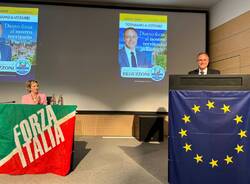Strike at Whirlpool against the closure of Caserta and Turin
The trade unions, FIOM, FIM and UILM, called a strike, with meetings and protests at the factory in Cassinetta

The metalworkers’ unions had made a demand during the meeting with the Whirlpool managers at the Ministry for Economic Development, on Monday 20 April, in Rome: give up on the idea of closing the factories in Carinaro (near Caserta) and None (near Turin) before you illustrate the business plan, otherwise the negotiations will not proceed. And to demonstrate their determination, FIOM, FIM UILM and UGL said they would call meetings, strikes and protests.
The company said it was willing to listen, a willingness that the trade unions did not consider sufficient to stop the protests. The joint trade union representative at the factory in Cassinetta di Biandronno called a general meeting, from 9.30 to 10.30 a.m., followed by a strike lasting two and a half hours, with a march at the end, in which about 800 employees took part. “If production doesn’t resume at the factories in Turin and Caserta, we won’t even start negotiating,” Matteo Berardi, the FIOM CGIL representative, said. “Furthermore, while the Indesit method was that of going to Rome, ours is quite different: the negotiations should be done at the factory. And here, the fact that we’ve resisted so far, despite the crisis and globalisation, is because we’ve never departed from this principle, and we certainly don’t intend to do so now.”
The plan announced by Whirlpool entails 1350 layoffs. In fact, the American multinational inherited 950 layoffs from the Indesit Group, which, in 2013, had avoided them, at the last moment, with solidarity contracts. Thus, the actual number of Whirlpool dismissals is 400, and for the first time, these will significantly affect the office workers, many of whom were present at the meeting at the factory in Cassinetta di Biandronno.
“This situation starts a new chapter between Whirlpool and the external world,” explained Mario Ballante, of FIM CISL. “However, competition between regions, which exists, is one thing, reasoning in Darwinian terms is quite another. What we’re saying is that the production that is part of the business plan should not stop, that a flame should be kept alight, so that it can be resumed, taking a route where everyone plays his part: the company, employees, trade unions and authorities. What is important is that production does not cease, otherwise it will never start again.”
“Following the commitment that the Prime Minister, Matteo Renzi, made to a delegation of employees of the factory in Caserta, we’re hopeful about the next negotiations at the Ministry for Economic Development, which the Minister is also expected to attend,” said Francesco Nicolia, the Provincial Secretary of UILM. “The social risk that is being run by putting over 900 employees out into the street is extremely high, and no government can afford it. This is why this match should be played at a national level, because the interests at stake go beyond the level of the individual factories. We left the negotiation table because we considered the fact that the company was taking these closures for granted, unacceptable.”
The trade unions have not said it openly, but it is clear that, when they said everyone must play their part, two examples, in which government mediation was decisive, immediately came to mind: the case of Electrolux, which, with solidarity contracts and a massive contributions reduction, gave the Swedes more time to decide what to do, and that of the steelworks in Terni. The joint trade union representative in Cassinetta has said that he wants to bring the negotiations back into the factories and not to the Ministries, which has always, or almost always, been done at these latitudes, since the days of Mister Ignis. However, the main problem remains: what should Whirlpool do with the plants that have the same production? In the business plan, there is a redistribution of specialisations at the two main sites of Varese and Fabriano; productions, like that of microwave ovens, which initially Indesit bought from China, and all design for washing, which, today, is done in Germany, will be brought back to Italy. Will there be enough for everyone?
TAG ARTICOLO
La community di VareseNews
Loro ne fanno già parte
Ultimi commenti
flyman su Ilaria Salis candidata alle europee con Alleanza Verdi Sinistra nel collegio NordOvest
Alberto Gelosia su Ilaria Salis candidata alle europee con Alleanza Verdi Sinistra nel collegio NordOvest
lenny54 su I no vax sono tornati a colpire in provincia: imbrattati i muri della redazione di Varesenews
malauros su I no vax sono tornati a colpire in provincia: imbrattati i muri della redazione di Varesenews
Felice su I no vax sono tornati a colpire in provincia: imbrattati i muri della redazione di Varesenews
PaoloFilterfree su A Varese Salvini prova a ricucire passato e futuro della Lega, ma Bossi non c'è

















Accedi o registrati per commentare questo articolo.
L'email è richiesta ma non verrà mostrata ai visitatori. Il contenuto di questo commento esprime il pensiero dell'autore e non rappresenta la linea editoriale di VareseNews.it, che rimane autonoma e indipendente. I messaggi inclusi nei commenti non sono testi giornalistici, ma post inviati dai singoli lettori che possono essere automaticamente pubblicati senza filtro preventivo. I commenti che includano uno o più link a siti esterni verranno rimossi in automatico dal sistema.